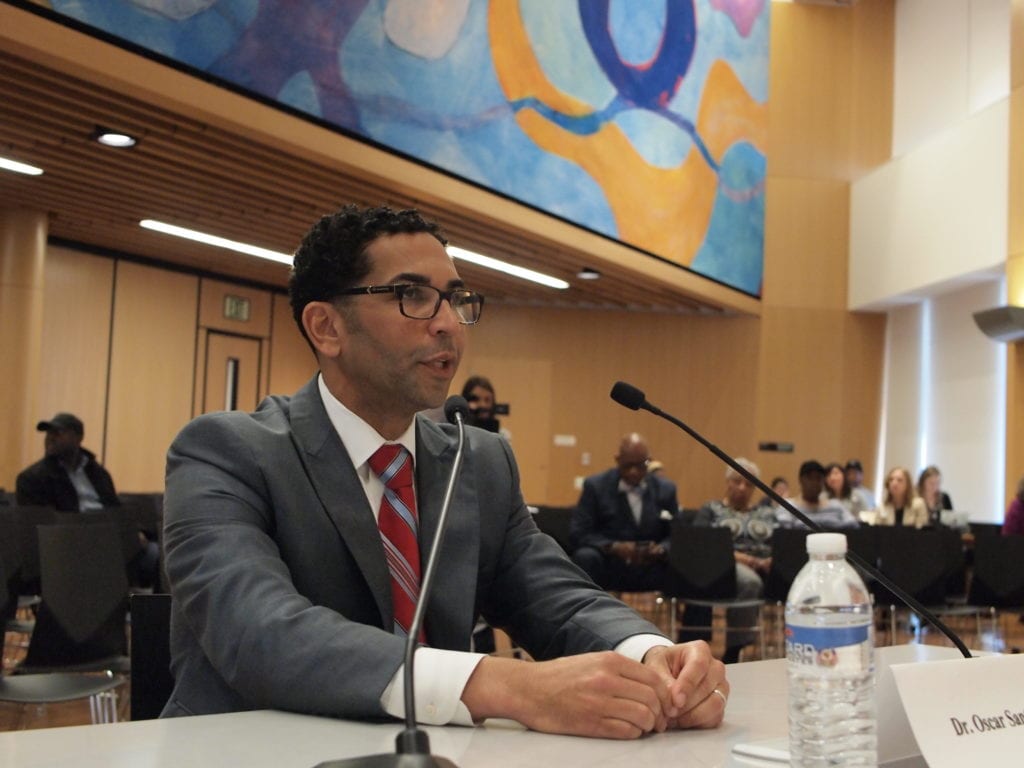BPS superintendent candidate Oscar Santos emphasizes Boston roots
School Committee members press Santos on Randolph record

Former Randolph Public Schools Superintendent Oscar Santos emphasized his Boston roots and his experience as a classroom teacher and school leader in Boston in his interview with the Boston School Committee Wednesday.
“I understand this city,” he said in his closing remarks to the School Committee. “I grew up in this city. I have family in this city. I have nephews, nieces who are in the Boston public schools. I understand how important this job is, I understand the hard work ahead. And I want you to understand that I am 100 percent committed to doing this work.”
In their questions, School Committee members drilled down on Santos’ ideas and his record as head of the Randolph school system.
“You talked about your relationship with the town manager,” School Committee member Michael O’Neill said. “You didn’t talk about your relationship with the [Randolph] School Committee.”
Santos, who did not renew his contract after two years in Randolph, told the school board that his priorities were “not aligned with the priorities of the majority of the Randolph School Committee.”
At the time that Santos left the Randolph job, School Committee member Andrew Azer, then a Santos supporter, told the Boston Globe that Santos lacked administrative experience.
In his answer to O’Neill, Santos said the Randolph school board was “a divided committee” and said he learned the importance of building relationships.
“When you look at the fact that there’s differences of opinions and different perspectives, that’s natural,” he said. “It’s about making sure you listen, making sure you learn and that you build those relationships.”
MassCore standards
O’Neill also questioned Santos’ assertion that he would seek to implement the state’s MassCore standards for graduation at Boston high schools. Currently, Boston high schools individually determine what requirements are needed for graduation. The MassCore standards are what state Department of Elementary and Secondary Education officials say students need for college readiness.
O’Neill asked how Santos would reconcile his insistence on the use of MassCore standards with the Boston schools’ autonomy.
Santos acknowledged that not every student may want to go to college, but he said the standards would better enable students to obtain jobs in Boston.
“We know that in the city of Boston, to be able to get any job today, based on the wealth gap in Boston, you have to have an associate’s degree,” he said. “Fifty percent of the jobs, you need to have a minimum of an associate’s degree to get a job in Boston today.”
Santos said he would work with headmasters on implementing such a policy.
“It’s working with people,” he said. “It’s not dictating. It’s about ownership and bringing the headmasters together to support that work.”
Teacher diversity
When School Committee member Lorna Rivera asked Santos about his approach to diversifying the mostly-white teaching staff at BPS, Santos cited his work in Randolph, where leadership in the school department was 10 percent people of color, despite students of color making up the majority of the student body. He said that when he left, school department leadership had risen to 35 percent people of color.
He said he believes diversifying the teaching staff is important for improving the learning environment in schools.
“Diversity is good for students,” he said. “It provides empathy. It provides examples of what the world really looks like. It prepares students for a multicultural world.”
School resources
When Committee member Hardin Coleman asked Santos how the city could help schools provide wraparound services for schools — including support for students’ out-of-school needs — Santos spoke about what he called “opportunity zones” in which schools connect to nearby institutions to help provide services.
“The city of Boston is rich in resources,” he said, noting that there are 38 colleges in the city, 22 public libraries, Boys and Girls clubs and other social service agencies.
“We have so many great programs,” he said. “Part of that is to really look at them as opportunity zones. How do we really look at the needs that schools have them and support them?”
Santos suggested that personnel within the school department would take responsibility for matching schools with outside resources.
School funding
In recent years, parents have asked that schools be given a basic needs budget that would insulate positions such as librarians, nurses and counselors from the cuts those positions frequently face. Responding to School Committee member Alexandra Oliver Davila’s question about the notion of a basic budget for individual schools, Santos said the emphasis should be on outside partnerships.
“Schools need to have adults that care, that are prepared and that support students,” he said. “That’s a core value. That’s about academic excellence. That’s about equity.”
Santos said beyond basic funding, schools need to be “entrepreneurial” and leverage relationships with businesses and local nonprofits.
Responding to Oliver Davila’s question about “right-sizing the district” — reducing the number of school buildings in Boston — Santos said the focus should be on “academically-sizing” the district.
“The focus should be on what are the academic frameworks we need so that then we can right-size,” he said.


![Banner [Virtual] Art Gallery](https://baystatebanner.com/wp-content/uploads/2024/04/Cagen-Luse_Men-at-store-e1713991226112-150x150.jpg)



